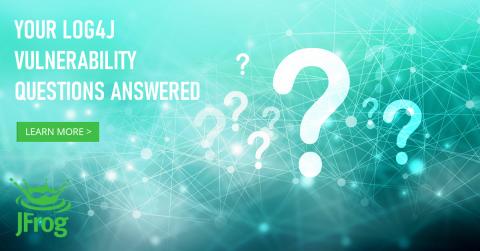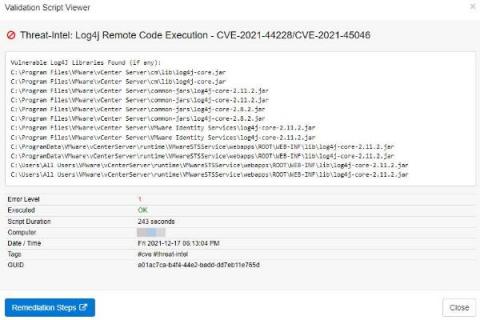Operations | Monitoring | ITSM | DevOps | Cloud
Java
Hunting and tracking remediation of Log4Shell (CVE-2021-44228)
The internet has been ablaze since the announcement of Log4Shell, the nickname for CVE-2021-44228, an arbitrary remote code execution vulnerability in the Java logging utility Log4j. So far two additional vulnerabilities ( CVE 2021-45046, CVE-2021-45105) have now been identified. The code has been vulnerable since 2013 and millions of hosts and services are affected.
Log4j Log4Shell Vulnerability Q&A
Discovering vulnerable Log4J libraries on your network with EventSentry
Just when the Microsoft Exchange exploit CVE-2021-26855 thought it would win the “Exploit of the year” award, it got unseated by the – still evolving – Log4J exploit just weeks before the end of the year! Had somebody asked Sysadmins in November what Log4J was then I suspect that the majority would have had no idea. It seems that the biggest challenge the Log4J exploit poses for Sysadmins is simply the fact that nobody knows all the places where Log4J is being used.
Log4Shell: How We Protect Sematext Users
On December 9, 2021, a vulnerability was reported that could allow a system running Apache Log4j 2 version 2.14.1 or below to be compromised and allow an attacker to execute arbitrary code on the vulnerable server. This vulnerability was registered on the National Vulnerability Database as CVE-2021-44228, with a severity score of 10. Here is a diagram of the attack chain from the Swiss Government Computer Emergency Response Team (GovCERT).
Log4j critical vulnerability advice for customers
At Avantra, our customers trust us to keep their business operations based on SAP running smoothly. I have written in the past about the importance of SAP security, and how I believe that in the next few years, SAP risks becoming an attack vector for hackers. It should come as no surprise that security is an area in which Avantra has invested significantly since I became CEO.
Defend Log4j Vulnerabilities with Cisco Secure Application
Log4j and VMware Tanzu Application Service
Nastel Products Are Not Affected by Log4j Vulnerability Issues
Recent news about Log4j has enterprises and vendors scrambling for information and answers, including customers of messaging middleware and Integration Infrastructure Management (i2M) products. Nastel Technologies customers will not be exposed to any risks from this vulnerability, but enterprises are encouraged to check with their Cloud and other solution vendors to protect themselves and their data.











